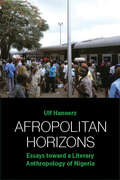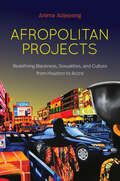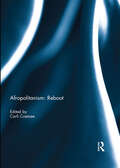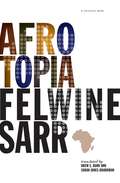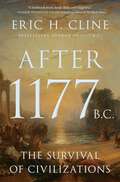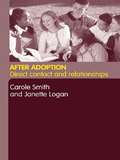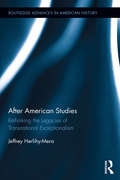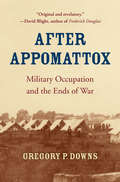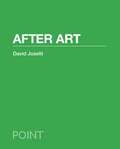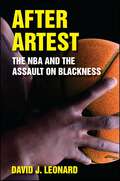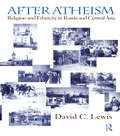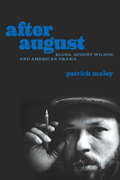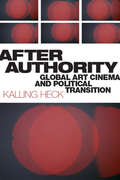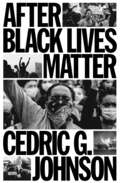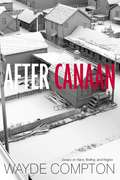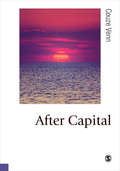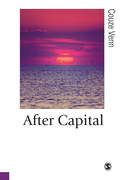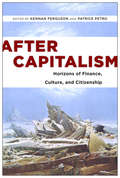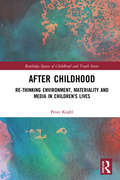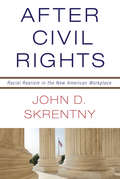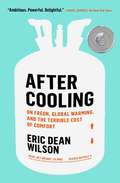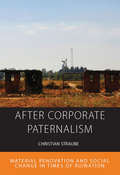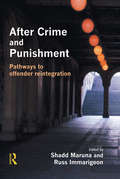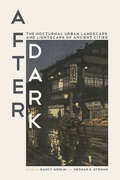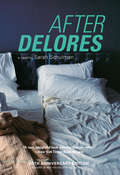- Table View
- List View
Afropolitan Horizons: Essays toward a Literary Anthropology of Nigeria
by Ulf HannerzNigeria is a country shaped by internal diversity and transnational connections, past and present. Leading Nigerian writers from Chinua Achebe, Amos Tutuola and Wole Soyinka to Chimamanda Ngozi Adichie and Teju Cole have portrayed these Nigerian issues, and have also written about some of the momentous events in Nigerian history. Afropolitan Horizons discusses their work alongside other novelists and commentators, as well as describing the ways in which Nigeria has appeared in foreign news reporting. It is all interwoven with the author’s own anthropological field research in a town in Central Nigeria.
Afropolitan Projects: Redefining Blackness, Sexualities, and Culture from Houston to Accra
by Anima AdjepongBeyond simplistic binaries of "the dark continent" or "Africa Rising," Africans at home and abroad articulate their identities through their quotidian practices and cultural politics. Amongst the privileged classes, these articulations can be characterized as Afropolitan projects--cultural, political, and aesthetic expressions of global belonging rooted in African ideals. This ethnographic study examines the Afropolitan projects of Ghanaians living in two cosmopolitan cities: Houston, Texas, and Accra, Ghana. Anima Adjepong's focus shifts between the cities, exploring contests around national and pan-African cultural politics, race, class, sexuality, and religion. Focusing particularly on queer sexuality, Adjepong offers unique insight into the contemporary sexual politics of the Afropolitan class. The book expands and complicates existing research by providing an in-depth transnational case study that not only addresses questions of cosmopolitanism, class, and racial identity but also considers how gender and sexuality inform the racialized identities of Africans in the United States and in Ghana. Bringing an understudied cohort of class-privileged Africans to the forefront, Adjepong offers a more fully realized understanding of the diversity of African lives.
Afropolitanism: Reboot
by Carli CoetzeeThis edited collection comprises an original and activist group of contributions on that much maligned figure, the Afropolitan. The contributors do not aim to define or fix the term anew; the reboot is, instead, the beginnings of an activist scholarly agenda in which ‘the Afropolitan’ is reimagined to include the stealthy figure crossing the Mediterranean by boat, and the Somali shopkeeper in a South African township. In their pieces included here, the authors insist on the need to ask questions about the inclusion of such globally mobile Africans in any theorisations of the transnational circuits we call Afropolitan. This collection, from some of the foremost voices on Afropolitanism, invigorates anew the debate, and reboots understandings of who the Afropolitan is, the many places he calls his origin, and the multiple places she comes to call home in the world. The chapters in this book were originally published in the Journal of African Cultural Studies.
Afrotopia (Univocal)
by Felwine SarrA vibrant meditation and poetic call for an African utopian philosophy of self-reinvention for the twenty-first century In the recent aftermath of colonialism, civil wars, and the AIDS crisis, a new day finally seems to be shining on the African continent. Africa has once again become a site of creative potential and a vibrant center of economic growth and production. No longer stigmatized by stereotypes or encumbered by the traumas of the past—yet unsure of the future—Africa has other options than simply to follow paths already carved out by the global economy. Instead, the philosopher Felwine Sarr urges the continent to set out on its own renewal and self-discovery—an active utopia that requires a deep historical reflection on the continent&’s vast mythological universe and ancient traditions, nourishes a cultural reinvention, and embraces green technologies for tackling climate change and demographic challenges.Through a reflection on contemporary African writers, artists, intellectuals, and musicians, Sarr elaborates Africa&’s unique philosophies and notions of communal value and economy deeply rooted in its ancient traditions and landscape—concepts such as ubuntu, the life force in Dogon culture; the Rwandan imihigo; and the Senegalese teranga. Sarr takes the reader on a philosophical journey that is as much inward as outward, demanding an elevation of the collective consciousness.Along the way, one sees the contours of an africanity, a contemporary Africa united as a continent through the creolization of its cultural traditions. This is Felwine Sarr&’s Afrotopia.
After 1177 B.C.: The Survival of Civilizations (Turning Points in Ancient History #12)
by Eric H. ClineIn this gripping sequel to his bestselling 1177 B.C., Eric Cline tells the story of what happened after the Bronze Age collapsed—why some civilizations endured, why some gave way to new ones, and why some disappeared forever&“A landmark book: lucid, deep, and insightful. . . . You cannot understand human civilization and self-organization without studying what happened on, before, and after 1177 B.C.&”—Nassim Nicholas Taleb, bestselling author of The Black SwanAt the end of the acclaimed history 1177 B.C., many of the Late Bronze Age civilizations of the Aegean and Eastern Mediterranean lay in ruins, undone by invasion, revolt, natural disasters, famine, and the demise of international trade. An interconnected world that had boasted major empires and societies, relative peace, robust commerce, and monumental architecture was lost and the so-called First Dark Age had begun. Now, in After 1177 B.C., Eric Cline tells the compelling story of what happened next, over four centuries, across the Aegean and Eastern Mediterranean world. It is a story of resilience, transformation, and success, as well as failures, in an age of chaos and reconfiguration.After 1177 B.C. tells how the collapse of powerful Late Bronze Age civilizations created new circumstances to which people and societies had to adapt. Those that failed to adjust disappeared from the world stage, while others transformed themselves, resulting in a new world order that included Phoenicians, Philistines, Israelites, Neo-Hittites, Neo-Assyrians, and Neo-Babylonians. Taking the story up to the resurgence of Greece marked by the first Olympic Games in 776 B.C., the book also describes how world-changing innovations such as the use of iron and the alphabet emerged amid the chaos.Filled with lessons for today's world about why some societies survive massive shocks while others do not, After 1177 B.C. reveals why this period, far from being the First Dark Age, was a new age with new inventions and new opportunities.
After Adoption: Direct Contact and Relationships
by Carole Smith Janette LoganFew children nowadays are placed for adoption with no form of contact planned with birth relatives and it has become common professional practice to advocate direct rather than indirect contact. Practice has outstripped evidence in this respect and not enough is known about how contact arrangements actually work out, particularly for older children adopted from state care. Such children have often experienced neglect, and sometimes abuse, and have frequently been adopted without parental agreement. Based on research with a large number of adoptive parents, children and birth relatives, After Adoption considers the impact of direct post-adoption contact on all concerned in such cases. It also:· discusses the development of adoption policy and law, particularly with regard to the legal and social consequences · reviews the research evidence on adopted children's contact with their birth families· explores through interviews: participants' feelings about adoption and direct contact; their relationships with each other; what hinders and what helps.After Adoption challenges readers to re-think the relationship between adoption and the possibility of direct post-adoption contact and at the same time provides a comprehensive understanding of adoption issues. It is a timely and valuable addition to the literature on adoption, making a substantial contribution to policy and practice.
After American Studies: Rethinking the Legacies of Transnational Exceptionalism (Routledge Advances in American History #8)
by Jeffrey Herlihy-MeraAfter American Studies is a timely critique of national and transnational approaches to community, and their forms of belonging and trans/patriotisms. Using reports in multicultural psychology and cultural neuroscience to interpret an array of cultural forms—including literature, art, film, advertising, search engines, urban planning, museum artifacts, visa policy, public education, and ostensibly non-state media—the argument fills a gap in contemporary criticism by a focus on what makes cultural canons symbolically effective (or not) for an individual exposed to them. The book makes important points about the limits of transnationalism as a paradigm, evidencing how such approaches often reiterate presumptive and essentialized notions of identity that function as new dimensions of exceptionalism. In response to the shortcomings in trans/national criticism, the final chapter initiates a theoretical consideration of a postgeographic and postcultural form of community (and of cultural analysis).
After Appomattox: Military Occupation and the Ends of War
by Gregory P. DownsThe Civil War did not end with Confederate capitulation in 1865. A second phase commenced which lasted until 1871--not Reconstruction but genuine belligerency whose mission was to crush slavery and create civil and political rights for freed people. But as Gregory Downs shows, military occupation posed its own dilemmas, including near-anarchy.
After Art (POINT: Essays on Architecture #2)
by David JoselitHow digital networks are transforming art and architectureArt as we know it is dramatically changing, but popular and critical responses lag behind. In this trenchant illustrated essay, David Joselit describes how art and architecture are being transformed in the age of Google. Under the dual pressures of digital technology, which allows images to be reformatted and disseminated effortlessly, and the exponential acceleration of cultural exchange enabled by globalization, artists and architects are emphasizing networks as never before. Some of the most interesting contemporary work in both fields is now based on visualizing patterns of dissemination after objects and structures are produced, and after they enter into, and even establish, diverse networks. Behaving like human search engines, artists and architects sort, capture, and reformat existing content. Works of art crystallize out of populations of images, and buildings emerge out of the dynamics of the circulation patterns they will house.Examining the work of architectural firms such as OMA, Reiser + Umemoto, and Foreign Office, as well as the art of Matthew Barney, Ai Weiwei, Sherrie Levine, and many others, After Art provides a compelling and original theory of art and architecture in the age of global networks.
After Artest: The NBA and the Assault on Blackness (SUNY series on Sport, Culture, and Social Relations)
by David J. LeonardOn November 19, 2004, a fight between NBA players Ron Artest and Ben Wallace escalated into a melee involving several other players and many fans. The "Palace Brawl," writes David J. Leonard, was a seminal event, one that dramatically altered outside perceptions of the sport. With commentators decrying the hip hop or gangsta culture of players, the blackness of the NBA was both highlighted and disdained. This was a harsh blow to the league's narrative of colorblindness long cultivated by Commissioner David Stern and powerfully embodied in the beloved figure of Michael Jordan. As Leonard demonstrates, the league viewed this moment as a threat needing intervention, quickly adopting policies to govern black players and prevent them from embracing styles and personas associated with blackness. This fascinating book discloses connections between the NBA's discourse and the broader discourse of antiblack racism. Particular policy changes that seemed aimed at black players, such as the NBA dress code and the debate over a minimum age requirement, are explored.
After Atheism: Religion And Ethnicity In Russia And Central Asia (Caucasus World)
by David LewisBased on interviews with people throughout Siberia, Central Asia and European Russia about their spiritual experiences, this book brings together insights into the 'religious' worldview of those who claim to be Buddhist, Muslim, Christian, pagan or even 'atheist'. Throughout the ex-Soviet Union peoples of many different ethnic backgrounds report such experiences but often do not know how to interpret them, a position helped or hindered by the fact that at the same time these people are trying to rediscover their ethnic and cultural identity.
After August: Blues, August Wilson, and American Drama
by Patrick MaleyCritics have long suggested that August Wilson, who called blues "the best literature we have as black Americans," appropriated blues music for his plays. After August insists instead that Wilson’s work is direct blues expression. Patrick Maley argues that Wilson was not a dramatist importing blues music into his plays; he was a bluesman, expressing a blues ethos through drama.Reading Wilson’s American Century Cycle alongside the cultural history of blues music, as well as Wilson’s less discussed work—his interviews, the polemic speech "The Ground on Which I Stand," and his memoir play How I Learned What I Learned—Maley shows how Wilson’s plays deploy the blues technique of call-and-response, attempting to initiate a dialogue with his audience about how to be black in America. After August further contends that understanding Wilson as a bluesman demands a reinvestigation of his forebears and successors in American drama, many of whom echo his deep investment in social identity crafting. Wilson’s dramaturgical pursuit of culturally sustainable black identity sheds light on Tennessee Williams’s exploration of oppressive limits on masculine sexuality and Eugene O’Neill’s treatment of psychologically corrosive whiteness. Today, the contemporary African American playwrights Katori Hall and Tarell Alvin McCraney repeat and revise Wilson’s methods, exploring the fraught and fertile terrain of racial, gender, and sexual identity. After August makes a significant contribution to the scholarship on Wilson and his undeniable impact on American drama.
After Authority: Global Art Cinema and Political Transition
by Kalling HeckAfter Authority explores the tendency in art cinema to respond to political transition by turning to ambiguity, a system that ideally stems the reemergence of authoritarian logics in art and elsewhere. By comparing films from Italy, Hungary, South Korea, and the United States, this book contends that the aesthetic tradition of ambiguity in art cinema can be traced to post-authoritarian conditions and that it is in the context of a transition away from authoritarianism where art cinema aesthetics become legible. Art cinema, then, can be seen as a mode of cinematic practice that is at its core political, as its constitutive ambiguity finds its roots in the rejection of centralized and hierarchical configurations of authority. Ultimately, After Authority proposes a history of art cinema predicated on the potentials, possibilities, and politics of ambiguity.
After Black Lives Matter
by Cedric JohnsonContemporary policing reflects the turn from welfare to domestic warfare as the chief means of regulating the excluded and oppressedThe historic uprising in the wake of the murder of George Floyd transformed the way we think about race and policing. Why did it achieve so little in the way of substantive reforms? After Black Lives Matter argues that the failure to leave an institutional residue was not simply due to the mercurial and reactive character of the protests. Rather, the core of the movement itself failed to locate the central racial injustice that underpins the crisis of policing: socio-economic inequality.For Johnson, the anti-capitalist and downwardly redistributive politics expressed by different Black Lives Matter elements has too often been drowned out in the flood of black wealth creation, fetishism of Jim Crow black entrepreneurship, corporate diversity initiatives, and a quixotic reparations demand. None of these political tendencies addresses the fundamental problem underlying mass incarceration.That is the turn from welfare to domestic warfare as the chief means of regulating the excluded and oppressed. Johnson sees the way forward in building popular democratic power to advance public works and public goods. Rather than abolishing police, After Black Lives Matter argues for abolishing the conditions of alienation and exploitation contemporary policing exists to manage.
After Canaan
by Wayde Compton"Compton pushes us to look beneath the surface--past those comforting tales of nationhood and racial solidarity--to the more nebulous and ever-shifting truth. This is a brilliant and original work that should be mandatory reading for any student of race and history."--Danzy Senna, author of Caucasia After Canaan, the first nonfiction book by acclaimed African Canadian poet Wayde Compton, repositions the North American discussion of race in the wake of the tumultuous twentieth century. Written from the perspective of someone who was born and lives outside of African American culture, it riffs on the concept of Canada as a promised land (or "Canaan") encoded in African American myth and song since the days of slavery. These varied essays, steeped in a kind of history rarely written about, explore the language of racial misrecognition (also known as "passing"), the failure of urban renewal, humor as a counterweight to "official" multiculturalism, the poetics of hip hop turntablism, and the impact of the Obama phenomenon on the way we speak about race itself. Compton marks the passing of old modes of antiracism and multiculturalism, and points toward what may or may not be a "post-racial" future, but will without doubt be a brave new world of cultural perception. After Canaan is a brilliant and thoughtful consideration of African (North) American culture as it attempts to redefine itself in the Obama era.
After Capital (Published in association with Theory, Culture & Society)
by Couze VennThe present crisis of capitalism has a history. A history of the private accumulation of wealth through property regimes which allow increasing commodification and the privatisation of resources: from land to knowledge and even to life itself. Understanding that history may allow us to imagine alternatives after Capital which are no longer private but common. After Capital explores this history, showing how the economy is linked to environmental damage, climate change, resource depletion, and to massive inequality. It takes the reader from liberalism to neoliberalism, from climate change to the Anthropocene, and shows how this history is inextricably the history of colonialism. It is a rich and detailed narrative of capitalism over the last 200 years, that explains its texture and its neoliberal endgame. This discussion frames speculation on what postcapitalist societies could be, with regimes of private accumulation replaced by a politics and ethics of a democratic and ecologically- grounded Commons.
After Capital (Published in association with Theory, Culture & Society)
by Couze VennThe present crisis of capitalism has a history. A history of the private accumulation of wealth through property regimes which allow increasing commodification and the privatisation of resources: from land to knowledge and even to life itself. Understanding that history may allow us to imagine alternatives after Capital which are no longer private but common. After Capital explores this history, showing how the economy is linked to environmental damage, climate change, resource depletion, and to massive inequality. It takes the reader from liberalism to neoliberalism, from climate change to the Anthropocene, and shows how this history is inextricably the history of colonialism. It is a rich and detailed narrative of capitalism over the last 200 years, that explains its texture and its neoliberal endgame. This discussion frames speculation on what postcapitalist societies could be, with regimes of private accumulation replaced by a politics and ethics of a democratic and ecologically- grounded Commons.
After Capitalism: Horizons of Finance, Culture, and Citizenship
by Andrew Ross A. Aneesh Geoff Mann Marcus Bullock Jeffrey Sommers Sherryl Vint Bernard C. Perley Cristina Venegas Esther Leslie Kennan Ferguson Niki Akhavan Patrice Petro Ivan AscherFrom Thomas Piketty to David Harvey, scholars are increasingly questioning whether we are entering into a post-capitalist era. If so, does this new epoch signal the failure of capitalism and emergence of alternative systems? Or does it mark the ultimate triumph of capitalism as it evolves into an unstoppable entity that takes new forms as it engulfs its opposition? After Capitalism brings together leading scholars from across the academy to offer competing perspectives on capitalism's past incarnations, present conditions, and possible futures. Some contributors reassess classic theorizations of capitalism in light of recent trends, including real estate bubbles, debt relief protests, and the rise of a global creditocracy. Others examine Marx's writings, unemployment, hoarding, "capitalist realism," and coyote (trickster) capitalism, among many other topics. Media and design trends locate the key ideologies of the current economic moment, with authors considering everything from the austerity aesthetics of reality TV to the seductive smoothness of liquid crystal. Even as it draws momentous conclusions about global economic phenomena, After Capitalism also pays close attention to locales as varied as Cuba, India, and Latvia, examining the very different ways that economic conditions have affected the relationship between the state and its citizens. Collectively, these essays raise provocative questions about how we should imagine capitalism in the twenty-first century. Will capitalism, like all economic systems, come to an end, or does there exist in history or elsewhere a hidden world that is already post-capitalist, offering alternative possibilities for thought and action?
After Childhood: Re-thinking Environment, Materiality and Media in Children's Lives (Routledge Spaces of Childhood and Youth Series)
by Peter KraftlThis book offers a new approach for theorising and undertaking childhood research. It combines insights from childhood and generational studies with object-oriented ontologies, new materialisms, critical race and gender theories to address a range of key, intractable challenges facing children and young people. Bringing together traditional social-scientific research methods with techniques from digital media studies, archaeology, environmental nanoscience and the visual arts, After Childhood: Re-thinking Environment, Materiality and Media in Children's Lives presents a way of doing childhood research that sees children move in and out of focus. In doing so, children and their experiences are not completely displaced; rather, new perspectives on concerns facing children around the world are unravelled which dominant approaches to childhood studies have not yet fully addressed. The book draws on the author’s detailed case studies from his research in historical and geographical contexts. Examples range from British children’s engagement with plastics, energy and other matter, to the positioning of diverse Brazilian young people in environmental and resource challenges, and from archaeological evidence about childhoods in the USA and Europe to the global circulation of children’s toys through digital media. The book will appeal to human geographers, sociologists, anthropologists, education studies scholars and others working in the interdisciplinary field of childhood studies, as well as to anyone looking for a range of novel, interdisciplinary frames for thinking about childhood.
After Civil Rights: Racial Realism in the New American Workplace
by John D. SkrentnyA provocative new approach to race in the workplaceWhat role should racial difference play in the American workplace? As a nation, we rely on civil rights law to address this question, and the monumental Civil Rights Act of 1964 seemingly answered it: race must not be a factor in workplace decisions. In After Civil Rights, John Skrentny contends that after decades of mass immigration, many employers, Democratic and Republican political leaders, and advocates have adopted a new strategy to manage race and work. Race is now relevant not only in negative cases of discrimination, but in more positive ways as well. In today's workplace, employers routinely practice "racial realism," where they view race as real—as a job qualification. Many believe employee racial differences, and sometimes immigrant status, correspond to unique abilities or evoke desirable reactions from clients or citizens. They also see racial diversity as a way to increase workplace dynamism. The problem is that when employers see race as useful for organizational effectiveness, they are often in violation of civil rights law.After Civil Rights examines this emerging strategy in a wide range of employment situations, including the low-skilled sector, professional and white-collar jobs, and entertainment and media. In this important book, Skrentny urges us to acknowledge the racial realism already occurring, and lays out a series of reforms that, if enacted, would bring the law and lived experience more in line, yet still remain respectful of the need to protect the civil rights of all workers.
After Cooling: On Freon, Global Warming, and the Terrible Cost of Comfort
by Eric Dean WilsonThis dazzlingly original work of literary nonfiction interweaves the science and history of the powerful refrigerant (and dangerous greenhouse gas) Freon with a haunting meditation on how to live meaningfully and morally in a rapidly heating world.In After Cooling, Eric Dean Wilson braids together air-conditioning history, climate science, road trips, and philosophy to tell the story of the birth, life, and afterlife of Freon, the refrigerant that ripped a hole larger than the continental United States in the ozone layer. As he traces the refrigerant&’s life span from its invention in the 1920s—when it was hailed as a miracle of scientific progress—to efforts in the 1980s to ban the chemical (and the resulting political backlash), Wilson finds himself on a journey through the American heartland, trailing a man who buys up old tanks of Freon stockpiled in attics and basements to destroy what remains of the chemical before it can do further harm. Wilson is at heart an essayist, looking far and wide to tease out what particular forces in American culture—in capitalism, in systemic racism, in our values—combined to lead us into the Freon crisis and then out. It&’s a story that offers a rare glimpse of environmental hope, suggesting that maybe the vast and terrifying problem of global warming is not beyond our grasp to face.
After Corporate Paternalism: Material Renovation and Social Change in Times of Ruination (Integration and Conflict Studies #24)
by Christian StraubeIn this ethnographic study of post-paternalist ruination and renovation, Christian Straube explores social change at the intersection of material decay and social disconnection in the former mine township Mpatamatu of Luanshya, one of the oldest mining towns on the Zambian Copperbelt. Touching on topics including industrial history, colonial town planning, social control and materiality, gender relations and neoliberal structural change, After Corporate Paternalism offers unique insights into how people reappropriate former corporate spaces and transform them into personal projects of renovation, fundamentally changing the characteristics of their community.
After Crime and Punishment
by Shadd Maruna Russ ImmarigeonThe issue of resettling ex-prisoners and ex-offenders into the community has become an increasingly important one on both sides of the Atlantic. In the USA the former Attorney General Janet Reno identified the issue as 'one of the most pressing problems we face as a nation' in view of the massive prison population and the rapid increase in rates of incarceration, while in the UK it has become an increasingly important issue for similar reasons, and the subject of recent reports by HM Inspectorate of Prisons and HM Inspectorate of Probation, as well as from the Social Exclusion Unit of the Home Office. Yet this issue has not been well served by the criminological literature, and the new policies and programmes that have been set up to address the problem have not been well grounded in criminological thinking. This book seeks to address the important set of issues involved by bringing together the best of recent thinking and research into desistance from crime, drawing upon research in both the UK and the USA, and with a distinct focus on how this might impact upon the design and implementation of ex-offender reintegration policy.
After Dark: The Nocturnal Urban Landscape and Lightscape of Ancient Cities
by Nancy Gonlin Meghan E. StrongAfter Dark explores the experience of nighttime within ancient urban settings. Contributors present material evidence related to how ancient people manipulated and confronted darkness and night in urban landscapes, advancing our knowledge of the archaeology of cities, the archaeology of darkness and night, and lychnology (the study of ancient lighting devices). Sensory archaeology focuses on the sensual experience of the nocturnal environment—the sights, sounds, smells, tastes, and feel of an ancient city—and the multi-faceted stimuli that diverse urban populations experienced in the dark. Contributors investigate night work—for example, standing guard or pursuing nocturnal trades—and nightlife, such as gambling at Chaco Canyon. They also examine how urban architecture, infrastructure, and the corresponding lighting were inextricably involved in enabling nighttime pursuits and signaling social status. The subjects of the night, darkness, and illumination taken together form a comprehensive framework for analyzing city life. After Dark embraces night as a conceptual lens through which to view the material and visual cultures of the ancient world and, in doing so, demonstrates a wealth of activities, behaviors, and beliefs that took place between dusk and dawn. This perspective greatly enriches the understanding of urban life and its evolution and has much to offer archaeologists in deepening an examination of complexity and inequality. This volume will be of interest to any scholar or student of the past who is interested in urban activities and the significance of the night in urban settings. Contributors: Susan M. Alt, J. Antonio Ochatoma Cabrera, Martha Cabrera Romero, Tiffany Earley-Spadoni, Kirby Farrah, Nancy Gonlin, Anna Guengerich, Christopher Hernandez, John Janusek, Kristin V. Landau, Maggie L. Popkin, Monica L. Smith, Meghan E. Strong, Susan Toby Evans, Robert S. Weiner
After Delores
by Sarah SchulmanA madcap mixture of romance, crime and passion among a group of colorful women in New York City's lower east side.
